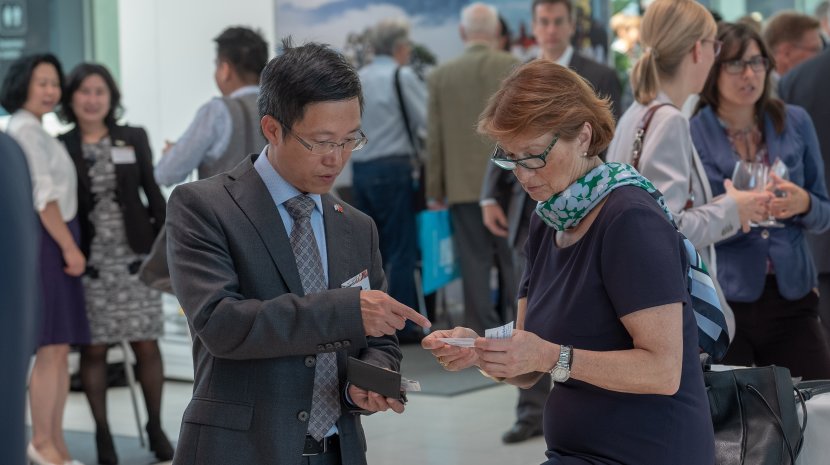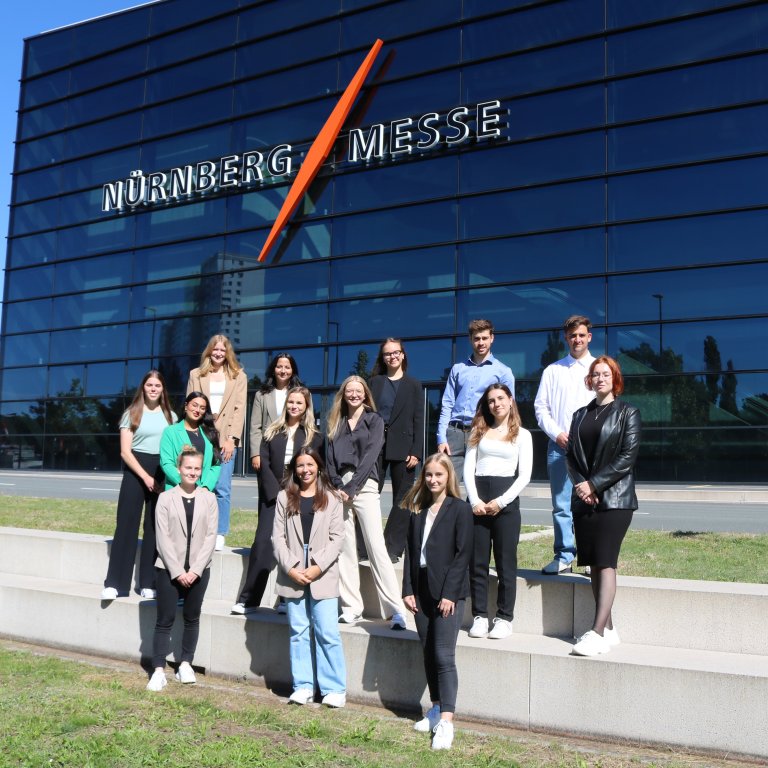

Behaviour in business and private life differs greatly between China and Germany. Dr. Hannelore Seelmann is an Asia expert and advises companies on business etiquette.
NürnbergMesse has had its own subsidiary in Shanghai for more than ten years now. Exhibitors from Germany also take part in NürnbergMesse China’s events. But as newcomers to China, many Europeans find themselves on uncertain ground. What’s the correct way to behave with my Chinese customers? How do people greet one another? And what should we talk about at dinner? NürnbergMesse offers culture courses for its employees from Germany. And Dr Hannelore Seelmann, who heads the seminar, knows the score in China.

Asia expert Dr. Hannelore Seelmann advises companies on their Asian business.
Everyday business in China is considerably more hierarchy-conscious than in Germany. So Asia expert Hannelore Seelmann’s counsels, “even before you meet your Chinese business partners, find out their position within the company. Because when you actually meet them, you’ll need to speak first to the one with the highest rank.” If you’re not sure, don’t hesitate to show it. “Bow slightly,” Seelmann advises. Your Chinese counterparts will recognize the signal and help out: the person with the highest rank will identify himself or herself. The next-highest in the hierarchy will come after. The general rule in China: better to be cautious than act rashly.
Shaking hands is a form of greeting that originated in Western Europe and has no tradition in China. All the same, rising contact with Western companies has led more and more Chinese business partners to adopt this social gesture – especially when meeting Western customers. “Take your counterpart’s hand, but don’t press too hard,” Seelmann counsels. A firm handshake, which in Germany is intended to demonstrate decisiveness and strong character, is experienced as rather unpleasant. Instead, simply place your hand gently in the other person’s.
Since communication in China often takes place in English, start by addressing your Chinese contacts with the formal “Mr” or “Ms” with their last name. But sometimes Chinese business partners will also offer to follow the American model and use their first names. For simplicity’s sake, many Chinese will adopt a Western first name that they’ve chosen themselves.

Small card, big meaning: The business card is very important in Asia.
An important part of a first meeting is the exchange of business cards. After all, they’re considered the most important way of clearly indicating a person’s position within a company’s hierarchy. High-quality paper and a distinguished design highlight the status of both the company and its employees. Titles that indicate rank, like “President”, “General Manager” and “Head of”, are important. Titles for Western company representatives like “Manager”, “Sales Manager”, and “Technical Support” are little help to the Chinese. “Invest in new calling cards,” is Seelmann’s advice. Bilingual, in English and Chinese, with a clear hierarchical title, on high-quality paper.
Exchanging calling cards is another risky moment. “Look at your Chinese business partner’s calling card carefully,” Seelmann urges. Tucking a card away unread – still worse, in your rear trouser pocket – or making notes on it, may be perceived as an insult. Correct form is to accept the card in both hands, read it attentively, keep it in your hand, and only later quietly put it away in your breast pocket or jacket pocket, or in a card case.
Eating together is an important affair for the Chinese, because it develops and confirms one’s membership of a group. People in China go to the table promptly at noon and around 6.30 in the evening. “Pay attention to those times,” the Asian expert prompts. The Chinese sit mostly at round tables for meals. Dishes are placed on a turntable in the middle, and all help themselves to whatever they wish.
At a first encounter, initially people exchange general information. That includes questions about family, children and parents. “Don’t be surprised if people ask you relatively soon how old you are”, Seelmann warns. In China, age too is important information in placing you in the right status.
At a meal, the Chinese hope to get to know the person behind the business partner. So Seelmann says you should avoid talking business at lunch or dinner. Appropriate topics include hobbies. Negative subjects are avoided. “They disrupt harmonious companionship and interfere with one’s enjoyment of the meal”, says Seelmann.
While eating, Chinese people want to get to know the person behind the business partner.
Rank also plays a major role at the table. “Wait for someone to show you where to sit.” Seating arrangements reflect hierarchy; at a round table, the highest-ranking person sits directly opposite the entrance. The next-highest positions are to that person’s right and left.
Wait patiently for the highest-ranking person at the table – often the host – to invite the diners to start eating. All the same, don’t immediately give in to the invitation – because usually the host will add further encouragement. As a guest, wait for the highest-ranking person to start eating. After eating, the Chinese leave the restaurant pretty abruptly. Here again, the highest-ranking person will give the sign that it’s time to go.
Since meals play such an important role in China, be careful not to offend your business partner with frank criticism of the food. If you’re not sure you’ll like a dish, try it first, and in case of doubt, leave it on your plate. “If something tastes especially good, be sure to mention that repeatedly. It will be the biggest compliment you can give your host”, says Seelmann.
Extended negotiations in China often make heavy demands on Western business partners’ ability to hold their drink. The Chinese may consume large amounts of alcohol even at lunch – especially Chinese men, for whom it signifies strength. A person who starts out drinking alcohol and switches to soft drinks looks to the Chinese as though they want to drop out of the party. Asia expert Seelmann advises refraining, with a mention of health concerns or religious constraints. Your Chinese business partners may not understand this attitude, but they will accept it. These and the other tips will keep your business projects from collapsing.

Shanghai is the economic metropolis of China and the location for several international companies, including NürnbergMesse China.
As much as many rules of conduct may differ between China and Germany, NürnbergMesse employees have been noting that the two cultures are moving closer together – especially in the business centre of Shanghai, where NürnbergMesse has had an office for over ten years now. “Our Chinese partners, customers and colleagues have a lot of experience working with Western business partners. Chinese and Western manners mix here”, says Dr Florian Wagner, International Relations & Business Management at NürnbergMesse. Many NürnbergMesse China employees have studied in the USA or Europe, and are at home in both cultural spheres. The best example of that is the Managing Director himself: Darren Guo was born in Shanghai, grew up in Lower Franconia, and has now come back to live in the world metropolis where he was born.
How to do business best in Brazil and enjoy life while you’re at it you can read here.
NürnbergMesse, with its strong partners and reliable networks, is establishing major trade fairs in growth markets, thus making it easier for many companies to enter those markets and get business moving there.
Image credits:
©Daniel - stock.adobe.com



